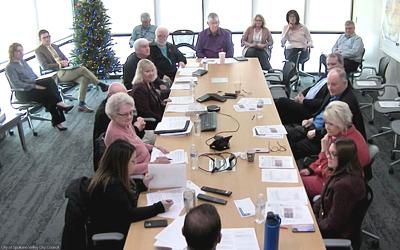(The Center Square) – Members of the Spokane Valley City Council on Monday outlined a holiday-season wish list. No, not to Santa Claus, but rather their state lawmakers in advance of Washington’s upcoming 2024 legislative session in Olympia.
The council presented its prioritized state policy agenda and funding requests to 4th Legislative District Sen. Mike Padden and Reps. Leonard Christian and Suzanne Schmidt.
Padden’s wife, city Councilmember Laura Padden, acknowledged that the three Republicans are “in the minority party” in the Democratic-controlled Legislature, but nonetheless encouraged their “continued support” of the community.
Christian replied, “You know we’ll support you.”
Sen. Padden said the lawmakers’ 60-day session starting Jan. 8 could be dominated by consideration of six statewide initiative proposals that have been or are pending submission to the Secretary of State’s office by a Dec. 29 deadline. The measures pertain to police vehicle pursuits, parents bill of rights, capital gains tax repeal, long-term care opt-out, opposing a state income tax, and carbon-tax repeal. If certified, lawmakers could approve them as presented, which Padden said was unlikely given the legislature’s current political makeup; send them to public vote later next year; or provide alternative measures for public vote.
The policy topics presented Monday by the council are shared by many communities across Washington: public safety and crime, tax relief, removing barriers in housing construction, ensuring local decision-making authority, increasing state-shared revenues, and addressing the state Growth Management Act.
Deputy mayor Rod Higgins noted the state currently has a positive revenue forecast in the coming year and hoped lawmakers could provide tax relief to residents as a result. At least one Republican lawmaker has proposed a gas-tax rebate to households, using a portion of the $2 billion generated this year by Washington’s new carbon tax.
Higgins said Spokane Valley is also hoping the state will approve a $600,000 funding request to supplement the city’s recent $4.4 million allocation from local lodging taxes toward development of a new 60-acre facility for cross country running and cyclocross bicycle races. The city has partnered with local nonprofit Spokane Sports on the project, which seeks to host events ranging from local youth to elite and collegiate competitions attracting participants from across the country. City officials believe the facility will be complement the Spokane region’s robust sports scene and further boost tourism and retail sales.
In the realm of public safety, Laura Padden indicated the city would like lawmakers to revisit recent measures that eliminated felony penalties for possession of controlled substances and take specific aim at fentanyl, which has caused a dramatic increase in overdose deaths in the state over the past two years. Both enforcement efforts and readily available treatment should be emphasized, she said. Mayor Pam Haley and councilmember Brandi Peetz added that children, in particular, are becoming more at risk because of exposure from parents using the potent opioid.
The council’s policy statement also encourages the state to fully fund and support a comprehensive behavioral and mental health system across Washington.
Separately, said Padden, Washington has a dubious distinction of being among the nation’s leaders in retail theft and has experienced a significant rise in fatality vehicle wrecks. In response, the state could increase resources to hire, retain, and protect law enforcement officers; increase driver education programs; and return to the lower threshold of “reasonable suspicion” rather than the current “probable cause” requirement for police to engage in most vehicle pursuits.
Councilmember Arne Woodard spoke on removing “barriers” to provide more housing and make construction more affordable. Measures could include providing tax incentives, evaluating impacts of state energy and building codes on construction, and revising liability regulations on condominiums. Sen. Padden did note that lawmakers passed a measure last year which allows condos to be designed as three-story structures, rather than two, potentially allowing the extra level for underground parking or retail space.
Councilmember Tim Hattenburg said the city would encourage amending the state’s Growth Management Act to make it easier to swap properties within designated urban growth areas, and for the state to allocate more money to implement mandated planning directives.
Peetz and Hattenburg also called for the legislature to respect local decision-making authority, including land-use decisions and rights-of-way management, and requiring the state to increase shared revenues with local government. Those could include monies obtained from fees and taxes levied on alcohol and marijuana sales, municipal criminal justice accounts, and city-county assistance accounts, they said.
Haley called for state reforms to requirements for construction and contractor services that raise costs on local governments. She referenced a statewide “disadvantaged business enterprise” requirement that fails to consider local or regional labor availability, saying the city has had to hire contractors from western Washington at more expense as a result. Both Christian and Schmidt acknowledged cost-inflation issues resulting from that.
Looking toward the session, Schmidt also spoke of a need to boost workforce development and apprenticeship programs in the construction trades industries, for the state Employment Security Department to consider equitability to employers regarding workers who quit and easily file for unemployment benefits, and barriers faced by out-of-state workers who want to become licensed in Washington.
Councilman Ben Wick and City Manager John Hohman told the three lawmakers that Spokane Valley will be seeking support in rebuilding the Sullivan Road Bridge over State Route 290 at Trent Avenue. Project design and rights-of-way are currently funded, and the city is actively seeking federal funding for the construction costs, estimated at $36.5 million, but state assistance will likely be needed in future years. The bridge is designated as “structurally deficient” by the state Department of Transportation and the interchange’s current layout causes “chaotic” traffic backups in one of the region’s busiest freight corridors during peak travel hours, documents state.
Wick said the city is also looking for state and federal grants to support a proposed performing arts center in the Spokane Valley-Idaho Central area that would include a main stage, studio theater, and conservatory with space for events, youth services, and organization/business meetings.









